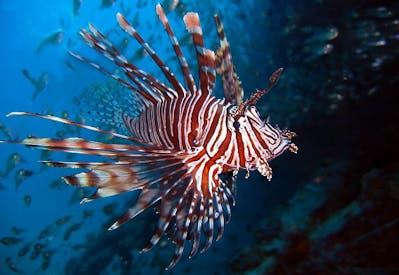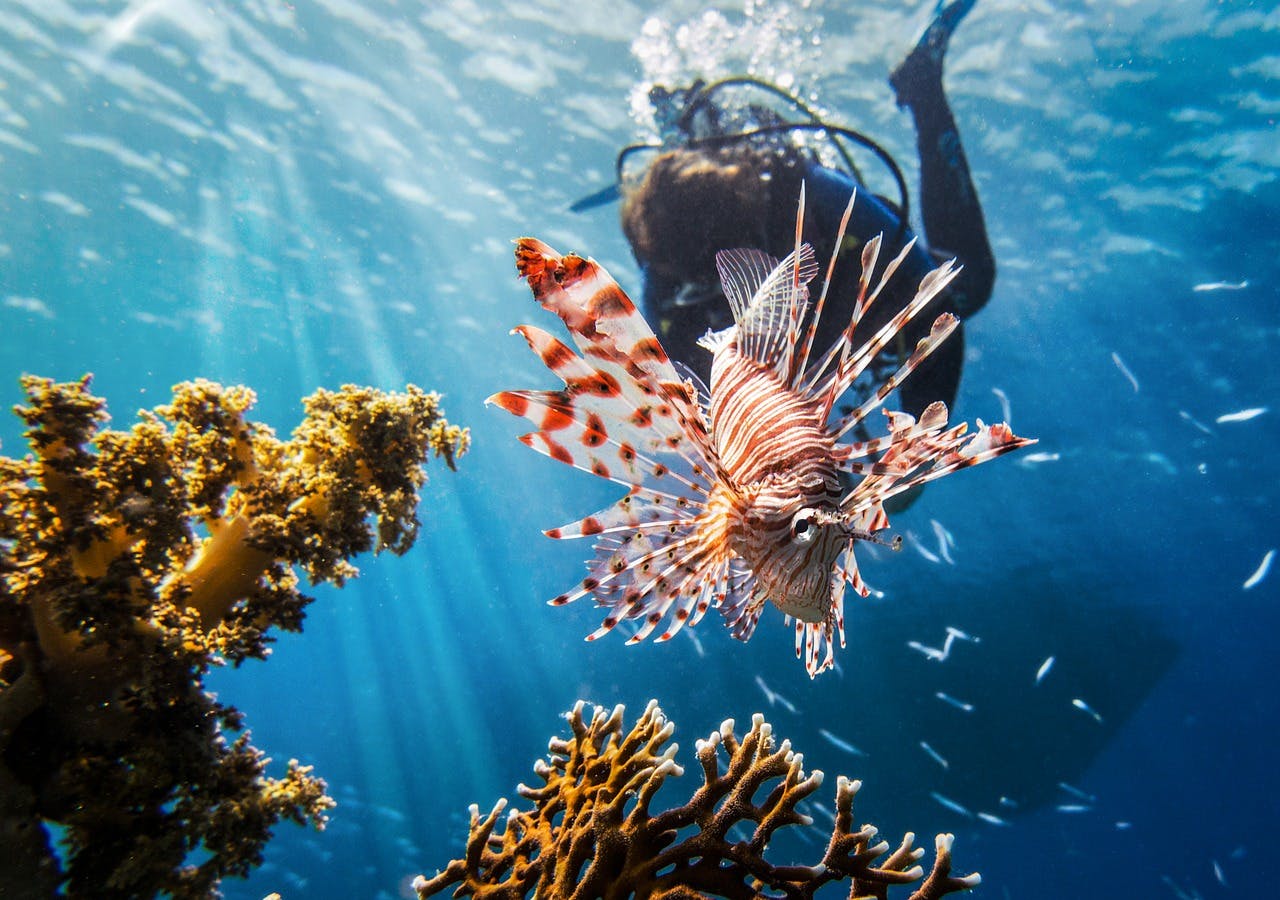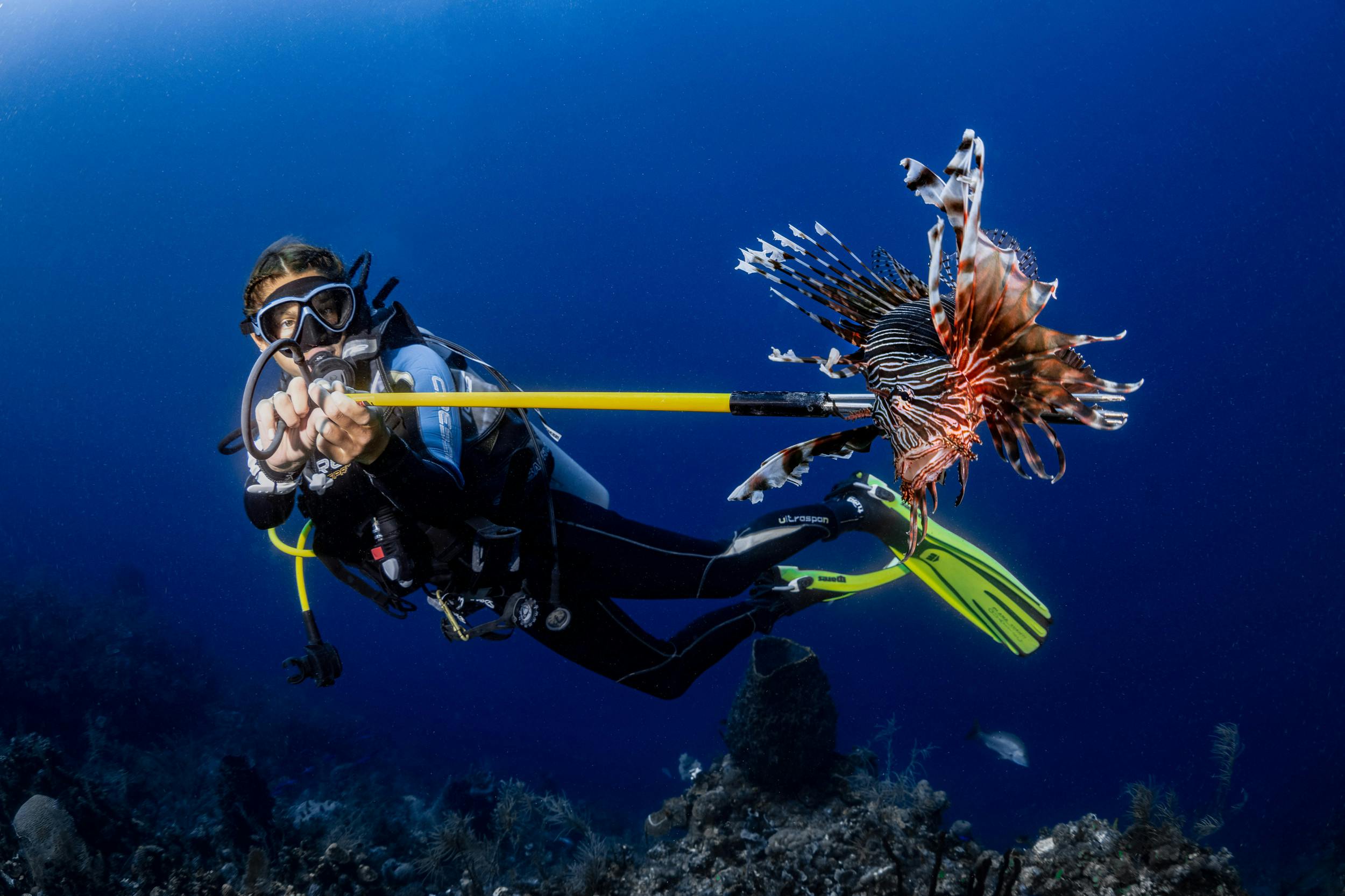Free Shipping on orders of $49+ | Signup for Direct Rewards
Free Shipping on orders of $49+ | Free Store Pickup | Signup for Direct Rewards
Free Shipping on orders of $49+ | Signup for Direct Rewards
Free Shipping on orders of $49+ | Free Store Pickup | Signup for Direct Rewards

Hear those sirens going off? There's an invasion happening just offshore! It's… It's… It’s the Lionfish! Lionfish are native to the Indo-Pacific oceans and have recently invaded the Atlantic Ocean. Lionfish have always been an iconically beautiful aquarium fish. Their beautiful array of fins and colorful candy stripes have made them a popular fish in the aquarium market. It is believed that in the 1980s a few Lionfish that had been brought over to the United States for aquariums were released into the ocean after they had gotten too large for their aquariums or because they were too aggressive towards the other fish.
Since their invasion, Lionfish have spread faster than any other invasive species. We can attribute this to their fast maturity and frequent reproduction. Lionfish can mature in about 1 year and then proceed to reproduce every 55 days throughout the entire year releasing roughly 2 million eggs every year. This widespread invasion has had some devastating effects on the Atlantic ecosystem. Lionfish move very slowly, so they have to rely on their bright colors and large fins to corner fish against rocks and crevices and ambush them. They have consumed over 50 different species of fish, and can consume up to 90% of their body weight every single day thanks to their expanding stomach. They have no natural predators other than humans because of their appearance to predators. Oh and the fact that they can inject a paralyzing venom into a predator if it comes into contact with their array of sharp spines.
Lionfish have the potential to destroy reef ecosystems not only because they eat certain species for themselves, but because by eating these species it takes away food for other important reef fish such as snapper and grouper. When Lionfish invade a coral reef, they can reduce the population of the fish they consume by 65% in only two years! They have starved out local fish, hurting commercial fishing and local markets. It is believed with how widespread these lionfish are, that it may be impossible to ever eradicate them.
Lionfish are native to the South Pacific and Indian Oceans, but as I mentioned above, they can now be found in the tropical waters of the Atlantic Ocean. From as far north as Long Island, New York to the Florida Keys, you can find Lionfish all along the United States Atlantic coast. Since their invasion, Lionfish have been found all over the Caribbean and Gulf of Mexico as well. They can be found pillaging shallow reefs or even venturing to depths of 1,000 ft deep. When searching for Lionfish, you can find them on the hard bottom, mangroves, sea grass, coral, and even artificial reefs such as wrecks. Pretty much about anywhere you look! It wasn’t like this originally though. In 2006, it was estimated that there were less than 7 Lionfish per acre in the Atlantic. Today, studies suggest that the number has grown by over 400%! Lionfish can live for up to 15 years, and like I mentioned earlier… They reproduce A LOT!

The Bahamas have become a hotspot for scuba diving thanks to its beautiful seascapes that can be dove year round. Lionfish have invaded the Bahamas and are thriving in their waters. They’ve taken over. It is estimated that you can find 160 Lionfish per acre! This is devastating to the reef ecosystem in the Bahamas and may continue to affect their entire economy in the future. Not only do they devour the smaller fish on the reef, but they take away the food sources for the other 1200 fish unique to the Bahamas that need to eat as well. These fish are important for the tourism industry as well as the commercial fishing industry that help keep the islands in business.

Ok. You’re diving and you see those beautiful candy cane stripes and fan-like fins. What do you do? Well first off, if you are not experienced in handling Lionfish, you should probably stay away. Their spines can deliver a sting that will cause extreme pain that can last for days or even longer. If you see a Lionfish while diving, you can report the sighting to the Reef Environmental Education Foundation (REEF) here.
Now if you would like to contribute to the eradication of Lionfish, the FWC encourages you to remove Lionfish from Florida waters. You can do this in a variety of ways. The most common and effective way of doing so is via pole spear. Simply load your sling band and get as close as you can to the fish before releasing and spearing the fish. Once you have speared your target, you can load it into a Lion Tamer Hotel to keep their spines away from you and other divers as you continue your hunt.
Hunting Lionfish is encouraged by the FWC and you can even be rewarded for your catch. There is no minimum size limit or daily bag limit in the Gulf or Atlantic in state and federal waters. You can harvest Lionfish year round without a fishing license if you are using a handheld device like a spear that is marketed exclusively for Lionfish. If you are using any other method of targeting lionfish such as hook and line, a recreational fishing license is required.
For more information on the FWC’s involvement in the Lionfish challenge click here.
To spear a Lionfish, grab your pole spear and get as close to the fish as possible. They are slow moving, and should not swim away if you move slowly and calmly. Once your shot is lined up, release the tension of your sling and spear the fish. After the fish has been speared you can insert the fish and spear into a Lion Tamer Hotel to keep it secure and out of the way of other divers. Make sure you do not damage the reef when spearing Lionfish and do not feed the Lionfish to other predatory species. This is dangerous as well as illegal in some locations.
Spears may not be used:

Lionfish are sometimes caught as bycatch in the commercial fishing industry. In most cases, they have the freedom to exit the traps, but are caught in them when they are being pulled up. I have worked on a commercial lobstering vessel and have caught many Lionfish in traps. In this case, you can use a pair of long metal tongs to grab the Lionfish and dispose of them. We don’t want these fish back in our oceans.
Lionfish is recognized as a delicacy around the world. Although it is typically not commercially fished, the meat is a beautiful white flakey fish that tastes amazing. There are many restaurants in Florida that serve Lionfish either year round, or seasonally. If you have yet to try some delicious Lionfish, visit one of them and have a taste!
If you would like to clean and cook Lionfish on your own, here’s how:
When you filet a Lionfish, it is very similar to fileting any other kind of fish. The only difference is you have to be extremely careful to avoid their venomous spines. They have 13 spines along the dorsal side of the fish, two spines on the pelvic fins, and 3 spines on the anal fin. There are no venomous spines on the pectoral fin, so hold the fish here or their bony gill plates and begin to filet it just like any other fish. You can wear puncture resistant gloves as a safety precaution, or even cut off the spines before you begin to filet the fish. Even when the fish has been long dead, the venom can still remain active in their spines.
At the end of the day, Lionfish are unlikely to ever be fully eradicated from our reef ecosystems in the Atlantic due to their extremely fast reproduction cycle. But it is important to do everything we can to slow the spread of these invasive fish. If you see a Lionfish in the ocean, you can either report it, or if you are prepared, you can hunt and harvest them to either give to the FWC, or consume for the delicious meat. Divers Direct has everything you need to hunt down these invasive creatures and give your friends and family a delicious meal after another great day out on the water.
Lionfish have 13 spines along the dorsal side of the fish, two spines on the pelvic fins, and 3 spines on the anal fin. These spines are all equipped with venomous barbs that can cause a lot of pain.
There are no recorded cases of fatalities caused by Lionfish stings, but they can still be very dangerous to children, the elderly, and people with allergies.
If you are stung by a Lionfish, you should first remove any remnants of the spines using gloves and tweezers. Avoid squeezing the venom glands if possible. Clean the affected area using soap and hot water. You can then use over the counter medicine to treat the pain and inflammation. If pain persists for longer than a few days, consult a doctor for further support. You may need an xray to see if spines have remained in your skin.
Lionfish have very few predators here in the Atlantic Ocean and have an uncontrollable appetite. They can eat up to 90% of their body weight leading to a decrease in important species of marine life in our local waters.
Lionfish are native to the South Pacific and Indian Oceans.
Lionfish were first reported in Dania Beach, FL in 1985 but it is unclear as to when they were first introduced. Most likely, just a few years prior.
Lionfish is indeed edible, and known to be a delicacy around the world. It has a delicious flakey white meat that can be fileted like any fish once the spines have either been removed or carefully fileted.